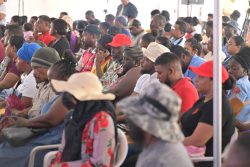The Centre of Communication Studies (CCS) of the University of Guyana (UG) will in the coming months be able to broadcast in and around the Turkeyen Campus, as plans to reissue a radio broadcast licence to the university are being finalized.
This was disclosed yesterday at a press conference in the boardroom of the Vice Chancellor’s Office which was attended by the Minister of Public Telecommunications, Catherine Hughes, Chairman of the Guyana National Broadcasting Authority (GNBA) Leslie Sobers, Vice Chancellor Ivelaw Griffith and staff of the Centre of Communication Studies.
The project, which is expected to be commissioned by Easter 2018, comes at a cost of US$79,000, and will comprise a 30 watt FM transmitter which is expected to target a radius of 15 miles from its location at the University’s Turkeyen Campus.
Once up and running, the radio station is expected to fill the gap of training labs in live radio/TV, as against packaged productions for students enrolled in the Diploma and Bachelor’s degrees in Communication Studies, and non-enrolled broadcasters in Guyana. It will also serve as a tool for community education, teaching and learning, and will support the more specialized training for those students in the soon to be launched programme, Masters in Visual Communication.
The primary audience will be the campus community, while the secondary focus would be the catchment area of the campus. The University does not view the station as competing with other stations, but rather for training personnel to enhance the overall quality of broadcasting in Guyana, with a focus on Education, History, Entertainment and Current Affairs.
According to Deputy Vice Chancellor of the University, Professor Paloma Mohamed the application for the TV licence will be new, since the University did not start teaching Television Broadcasting until the 2000’s, as part of the re-structuring of the CCS, and the upgrading of the curriculum, following HED-USAID and UNESCO injections and input.
This being said, plans are also underway to have the university broadcasting on its own television channel, thus providing an added opportunity for the Journalism and Communication students to receive hands-on training in live and production environments.
“Part of the big gap that this is going to fill is that we are going to be able to train people to do live on-air broadcasting, in both radio and television. It is going to create a forum for our student-led and faculty-led productions to be used by a wider community, so it’s not produced and just left there,” she said, before noting that youths from the community and media practitioners would also be trained.
Meanwhile, Chairman of the GNBA, Leslie Sobers publicly committed to ensuring that UG receives its radio licence as soon as the technical details are ironed out.
“The Guyana Broadcasting Authority stands committed to ensuring that the University of Guyana receives its broadcasting licence….once all the technicalities are ironed out, the frequency identified the licence will follow in a short trip. You can rest assured that the University again, will be on air,” he noted.
Minister of Public Telecommunications, Catherine Hughes reiterated government’s commitment to improve the delivery of education at the tertiary institution.
“You would recall that the issue of radio licensing has been a hot button issue going back to 2011 when radio licences were shared out like Chico sweets. This stormy issue has remained on our front burner ever since. You may have not heard us talk about it, but it has been very important and dear to many of us. Our Government have always held the view that there is no reason why the University of Guyana should have a communication studies department without that very important training tool, a radio station of its own,” she said.
“It will provide the opportunity to transfer theoretical knowledge into practical, on-the-job training. It will also save the university some expenses and most importantly communication students will now save some time and money, especially those who in the past would have to go to private studios for practice, or to record their course assignments,” Hughes added.
The Minister said it is a well-known fact that all over the world, universities operate their own radio stations, not only as a training tool, but as a very important tool of working to embrace the communities in which they reside. As such, university radio usually cements the relationship with communities which host the campuses and are accompanied by benefits that are always generally good.
“My hope and my wish is, this experience and this radio station will also be good for our community,” the Minister said.
However, she noted that the GNBA would not be able to be grant the licence until after the new and modern FM transmitter arrives in Guyana.
“Until the transmitter is set up and we can actually do our testing and determine the right frequencies, we cannot prepare and print that licence and hand it over,” Hughes explained.
The planned issuing of the radio licence comes after a request by the University of Guyana for the renewal of its licence was denied in 1990.








